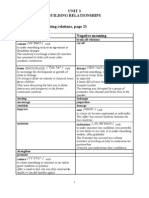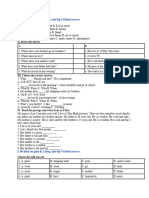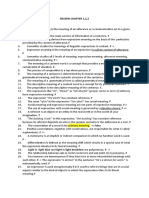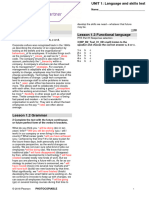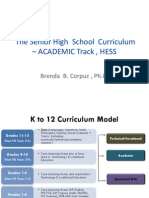Unit 2: Reading Bank
Unit 2: Reading Bank
Uploaded by
qwerty uiopCopyright:
Available Formats
Unit 2: Reading Bank
Unit 2: Reading Bank
Uploaded by
qwerty uiopOriginal Title
Copyright
Available Formats
Share this document
Did you find this document useful?
Is this content inappropriate?
Copyright:
Available Formats
Unit 2: Reading Bank
Unit 2: Reading Bank
Uploaded by
qwerty uiopCopyright:
Available Formats
Reading bank
Unit 2
1 Before you read, check that you know the meaning of the words in bold. Choose the
correct definition, a or b, for each word. Use a dictionary if necessary.
1 Through structured classroom teaching and a series of online activities, the course develops
strong theoretical knowledge of the topic.
a relating to the study of ideas rather than b relating to real situations and practical
practical experience experience rather than ideas
2 Specialised training allows students the opportunity to learn a range of competencies.
a degrees b skills
3 Another reason that the scheme thrives is the support it gets from the government.
a is very successful b exists
4 Most of the apprentices are loyal to the company they train with and choose to work for them
long term.
a remaining faithful to and supporting b grateful because someone has done
someone or something something kind for you
5 Vocational training is extremely important for career opportunities and growth.
a training that is based on ideas and b training that teaches you the skills you
theories rather than practical knowledge need for a particular job
6 Researchers tried to replicate the original experiment, but failed.
a copy exactly b understand
7 The company has just launched a campaign to promote awareness of environmental issues.
a help people understand something b help something to happen or develop
2 Read the text quickly and decide which section (A–E) has information to answer each question.
1 Can the programme be implemented in other countries? Section
2 How did a car company react to changing skills requirements? Section
3 Why is the programme important in today’s industry? Section
4 What is the dual vocational training programme? Section
5 How does the unemployment rate in Germany compare to the rest of Europe? Section
3 Decide if these statements are true (T), false (F) or if the text doesn’t give this information (NG).
1 The dual vocational training programme was first introduced for factory workers.
2 It is likely that a number of the tasks currently performed by workers will be performed by
machines in future.
3 The problem with BMW Group’s vocational scheme is that you can’t study for a degree.
4 Commitment to vocational schemes is one of the reasons that Germany has a lower
unemployment rate among young people.
5 Helmut Schweiger has been head of Gerresheimer’s largest plant for three years.
6 In Horsovsky Tyn, parents were more enthusiastic about the scheme than their children were.
4 Choose the correct option (a or b).
1 An advantage of the dual vocational system is that it provides an opportunity to
a meet people from a range of industries.
b combine practical work experience and studying.
2 Advances in technology mean that
a workers will not need to be qualified.
b employees will be required for more complex tasks.
3 When technology advances, companies such as BMW
a adapt their training courses.
b identify candidates who already have these skills.
4 In Germany, young people are more likely to
a apply for a vocational course after graduation.
b prefer an apprenticeship over university.
5 Helmut Schweiger set up the training scheme because
a young employees needed to be taught skills they had not learned at school.
b he wanted to prove to families that vocational training was important.
158
Z03 Bus Part TB B2 GLB 91263.indd 158 15/10/2018 13:03
Reading bank
5 Put the letters in brackets in the correct order to complete the paragraph. The
words are from the reading text. The first letter of each word is given.
Despite concerns regarding technological advances, it is clear that the workforce of the future
will still be required when dealing with 1c (pmoelxc) products. In
factories throughout the world, robots are already being used to 2a
(bassemel) various components and put the products together. However, robots are unlikely to
completely 3r (arpecle) a skilled workforce. A more intuitive range of
skills would be required to 4m (amtianni) modern machinery in order to
keep it in top condition. This would include training employees to 5s
(sreivce) equipment regularly and to strict standards. As technology develops, workers will have
to adapt their skills, but the factories, offices and laboratories of tomorrow will still be run by
people – that is, 6q (lqueaiifd) individuals working alongside intelligent
machines.
Importing the German vocational training system
A Germany’s apprenticeship programme, called the ‘dual vocational training programme’, gives
students theoretical education in the classroom, together with real-world experience on the factory
floor. And this is why it is highly recognised and admired worldwide – because of its combination of
theory and training in a real-life work environment.
5 B With the shift to software and robotics, many see Germany’s education programme becoming even
more important. ‘Automation and robots will primarily replace simple tasks,’ says Hermann Simon,
founder of consultancy Simon-Kucher & Partners. ‘But you still need workers who can make,
assemble, maintain and service complex products,’ he adds. ‘You could even say that the more
complex the products get, the more qualified workers have to be.’ So, it is important to ensure that the
10 programme stays up-to-date, and that graduates are skilled workers the industry will want to hire.
C Take BMW, for example. It has 4,600 apprentices training at nineteen locations, each learning one
of thirty competencies. Konstanze Carreras-Solé, head of apprentice training at the BMW Group
academy, says the programme is constantly changing to teach students new skills in areas such as
IT and 3D printing. Soon, BMW will even offer apprentices the ability to earn a bachelor’s degree,
15 without cost, as part of their training.
D The fact that vocational schemes can keep up with the times is one reason Germany has a 6.4 percent
unemployment rate for people under twenty-five, compared with an average of 19 percent across
Europe. Mr Simon warns that this success is not easy to replicate. One reason it thrives is because of
its roots in the German culture: more students choose vocational training than go to university. The
20 programme also fits into a wider cultural model that promotes social unity.
E So what does this mean for countries that are considering importing the German model? Horsovsky
Tyn is a small town in the Czech Republic where Gerresheimer, the German pharmaceuticals
packaging group, has its largest plant, with nearly 700 employees. Helmut Schweiger, head of the
plant, learned early on that hiring undereducated young people would not work. So he set up a joint
25 venture to provide free classroom and factory floor training, as in Germany. ‘It took us three years to
get young people interested,’ he recalls. ‘The problem was not girls and boys from school, but parents
and grandparents.’ Mr Schweiger had to convince entire families that learning skills would pay off in
the long term.
Asked what he thinks about the German model being implemented in other countries, he says that
30 it’s more about creating an environment that promotes social unity. ‘You can buy everything in a
company: the best materials, the best machinery. But you can never buy the best employees. You need
to make them loyal, proud and happy.’
159
Z03 Bus Part TB B2 GLB 91263.indd 159 15/10/2018 13:03
You might also like
- BP C1 Tests Unit4Document4 pagesBP C1 Tests Unit4cruz oeNo ratings yet
- BP C1 Tests Unit1Document4 pagesBP C1 Tests Unit1outia.inesNo ratings yet
- Business Partner b2 Workbook KeyDocument43 pagesBusiness Partner b2 Workbook Keyeliseo rodea100% (1)
- Answer Key Skillful Listening and Speaking 1 DocumentDocument4 pagesAnswer Key Skillful Listening and Speaking 1 Documenthanako chan0% (3)
- 930 - Unit 3, Building RelationshipsDocument11 pages930 - Unit 3, Building RelationshipszaizaiannieNo ratings yet
- Facing A New Chapter: Factors Affecting The Senior High School Career Preference of Grade 11 Students of Hipona National High SchoolDocument35 pagesFacing A New Chapter: Factors Affecting The Senior High School Career Preference of Grade 11 Students of Hipona National High SchoolKen B. Lutero91% (11)
- Đề thi chính thức vào 10 môn anh năm học 2022 2023 Hà NamDocument5 pagesĐề thi chính thức vào 10 môn anh năm học 2022 2023 Hà NamTú BéoNo ratings yet
- Writing BookDocument208 pagesWriting BookEmmy Nguyen100% (3)
- Intensive or Extensive ExtensiveDocument4 pagesIntensive or Extensive ExtensiveNguyễn Thị HàNo ratings yet
- Nghiên cứu sản phẩmDocument2 pagesNghiên cứu sản phẩmDuc Gia Minh0% (1)
- By Ainsley KarlDocument5 pagesBy Ainsley Karlqwerty uiopNo ratings yet
- Bus Part C1 ReadingBank U1Document2 pagesBus Part C1 ReadingBank U1qwerty uiopNo ratings yet
- Practise Unit 2 2.1Document15 pagesPractise Unit 2 2.1Leader KidzNo ratings yet
- Apart Ex : In, Into, Within, Toward, OnDocument15 pagesApart Ex : In, Into, Within, Toward, Onngocminhtran101No ratings yet
- Homework 3Document4 pagesHomework 3Uyên NguyễnNo ratings yet
- Semantics Chapter 4,5,6Document7 pagesSemantics Chapter 4,5,6Alex DiepNo ratings yet
- Lexical Contrastive Analysis - English and VietnameseDocument31 pagesLexical Contrastive Analysis - English and VietnamesePhương ThuNo ratings yet
- 285 Câu Trắc Nghiệm Thì Của Động Từ - Có Lời Giải Chi TiếtDocument58 pages285 Câu Trắc Nghiệm Thì Của Động Từ - Có Lời Giải Chi TiếtDecor Art100% (2)
- Nguyễn Ngọc Phương Anh K24B1.1 p3Document9 pagesNguyễn Ngọc Phương Anh K24B1.1 p3Nguyễn Anh HuyNo ratings yet
- Phùng Thị Bích Đào - DVB2103030042 - Bài Kiểm Tra Giữa Kì Môn Grammar - ĐHVBDocument3 pagesPhùng Thị Bích Đào - DVB2103030042 - Bài Kiểm Tra Giữa Kì Môn Grammar - ĐHVBThu PhuongNo ratings yet
- Market Leader Upper Intermediate - Vocabulary Unit 1Document4 pagesMarket Leader Upper Intermediate - Vocabulary Unit 1Vi Tường100% (1)
- Assignment 5Document4 pagesAssignment 5Hồ Trúc QuyênNo ratings yet
- Review Morpho MidtermDocument3 pagesReview Morpho MidtermGiang Trần ThịNo ratings yet
- Phạm Nguyễn Kiều Trang - LESSON PLAN 6F (READING) - FRIEND GLOBAL (LỚP 10)Document3 pagesPhạm Nguyễn Kiều Trang - LESSON PLAN 6F (READING) - FRIEND GLOBAL (LỚP 10)Kiều TrangNo ratings yet
- BP b2p CB Ak Answer Key of Bussiness Partner b2Document52 pagesBP b2p CB Ak Answer Key of Bussiness Partner b2Ngọc Lan LươngNo ratings yet
- Let's Get Started: by Than Hoai SonDocument20 pagesLet's Get Started: by Than Hoai SonThan Hoai Son100% (1)
- Morpho Test 2Document2 pagesMorpho Test 2Nguyễn Ái LinhNo ratings yet
- Phien Dich Thuong Mai - Teacher Book-1-148Document148 pagesPhien Dich Thuong Mai - Teacher Book-1-148Thanh Ngân Lưu HoàngNo ratings yet
- Unit 4 Managing Across Cultures: individual. chủ nghĩa tập thểDocument2 pagesUnit 4 Managing Across Cultures: individual. chủ nghĩa tập thểTrương Tiến ĐạtNo ratings yet
- Assignment 4 - Unit 10 - EthicsDocument4 pagesAssignment 4 - Unit 10 - EthicsHien UpNo ratings yet
- Critical-Thinking-đề thi giữa kìDocument31 pagesCritical-Thinking-đề thi giữa kìlvmh.mh11No ratings yet
- Luận văn về thời tiết - A study on idiomatic expressions containing words denoting weather in English and Vietnamese from cultural perspectiveDocument81 pagesLuận văn về thời tiết - A study on idiomatic expressions containing words denoting weather in English and Vietnamese from cultural perspectivelinh doanNo ratings yet
- Advanced Grammar - End Term Test - English DepartmentDocument5 pagesAdvanced Grammar - End Term Test - English DepartmentMỹ HạnhNo ratings yet
- NG Pháp CH C Năng KeysDocument11 pagesNG Pháp CH C Năng KeysGiang NguyễnNo ratings yet
- in What Ways Have Families Changed in The Last Hundred Years ?Document3 pagesin What Ways Have Families Changed in The Last Hundred Years ?Mai Anh HoàngNo ratings yet
- Exercise 3. Indicate, by A, B, C, Etc., To Which of The Following ClauseDocument11 pagesExercise 3. Indicate, by A, B, C, Etc., To Which of The Following ClauseNguyễn Anh HuyNo ratings yet
- Bài Nghe T NG H P T Sách Complete Ielts 6.5 7.5Document15 pagesBài Nghe T NG H P T Sách Complete Ielts 6.5 7.5Hồ Huỳnh Diệu Hoàng (Lychee)No ratings yet
- 001 Test PaperDocument5 pages001 Test PaperHiền PhạmNo ratings yet
- Đề thi giữa kì 2 lớp 4 global successDocument2 pagesĐề thi giữa kì 2 lớp 4 global successVũ Hoàng AnhNo ratings yet
- Donovan AnswersDocument1 pageDonovan AnswersDidier López100% (1)
- đề tham khảoDocument3 pagesđề tham khảoTlinhh Trần0% (1)
- BP C1 Tests Unit1Document7 pagesBP C1 Tests Unit1stigNo ratings yet
- Ngu Nghia Hoc Final - Update 30.7Document137 pagesNgu Nghia Hoc Final - Update 30.7Trần Thùy LinhNo ratings yet
- Week 5 Syntax - Functional ClassesDocument4 pagesWeek 5 Syntax - Functional ClassesKhue MinhNo ratings yet
- Bản sao của Functional Grammar- Bai tap tonghop-resendDocument14 pagesBản sao của Functional Grammar- Bai tap tonghop-resendTấn Tài VõNo ratings yet
- Ngữ Nghĩa Học - Mid-Term Test: I. TRUE/FALSE: Decide whether each of the following statements is TRUE or FalseDocument9 pagesNgữ Nghĩa Học - Mid-Term Test: I. TRUE/FALSE: Decide whether each of the following statements is TRUE or FalsegiangNo ratings yet
- RT 1A: READING 1.1 Read The Passage About Tim Stark. Choose The Best Prediction of What Tim Will Do. There Is Only One Right AnswerDocument3 pagesRT 1A: READING 1.1 Read The Passage About Tim Stark. Choose The Best Prediction of What Tim Will Do. There Is Only One Right AnswerAlik100% (1)
- Review Chapter 1,2,3 Part 1: Theory Task 1: T or FDocument4 pagesReview Chapter 1,2,3 Part 1: Theory Task 1: T or FDuong Hai NguyenNo ratings yet
- BP b2p CB Ak Answer Key of Bussiness Partner b2 - CompressDocument51 pagesBP b2p CB Ak Answer Key of Bussiness Partner b2 - Compressk61.2214110124No ratings yet
- Business Partner b2 Tests For All UnitsDocument40 pagesBusiness Partner b2 Tests For All UnitsKing DavidNo ratings yet
- Teaching Materials Unit11Document6 pagesTeaching Materials Unit11Ánh Dương HồNo ratings yet
- Biên Dịch 1 (1 SS BD1 5Unit)Document30 pagesBiên Dịch 1 (1 SS BD1 5Unit)nikitaNo ratings yet
- English ExamDocument11 pagesEnglish ExamAghakarim KarimovNo ratings yet
- 10 ĐIỂM HÌNH THÁI HỌCDocument5 pages10 ĐIỂM HÌNH THÁI HỌCLe HaoNo ratings yet
- BP B2 Tests Unit1Document6 pagesBP B2 Tests Unit1K60 NGUYỄN THỊ HỒNG NGỌCNo ratings yet
- Bài tập Vocabulary 11-12Document7 pagesBài tập Vocabulary 11-12Vy Tran Thi TuongNo ratings yet
- Unit 3, ... To Sense - HandoutDocument79 pagesUnit 3, ... To Sense - HandoutThu VânnNo ratings yet
- I. Paraphrase The Following Sentences Using Affixes:: 2. These Snakes Do Not HarmDocument2 pagesI. Paraphrase The Following Sentences Using Affixes:: 2. These Snakes Do Not Harmngọc diệpNo ratings yet
- bài giải semanticsDocument6 pagesbài giải semanticsVy KiềuNo ratings yet
- BusPart B2 ExClassPracWS U2Document6 pagesBusPart B2 ExClassPracWS U2MARYLAND Pedagogical CoordinationNo ratings yet
- New Opportunities Student Classes 3, 4Document8 pagesNew Opportunities Student Classes 3, 4tz4bkbphc5No ratings yet
- Unit 2Document4 pagesUnit 2Aghakarim KarimovNo ratings yet
- BP B2 Tests Unit2Document4 pagesBP B2 Tests Unit2Aghakarim KarimovNo ratings yet
- FreePhonicsreadingcomprehensionpassagesandactivitiesShortVowel 1Document12 pagesFreePhonicsreadingcomprehensionpassagesandactivitiesShortVowel 1Airod YzNo ratings yet
- Christmas Vocabulary: Ex 1: Match The Vocabulary To Pictures Before Comparing With A PartnerDocument2 pagesChristmas Vocabulary: Ex 1: Match The Vocabulary To Pictures Before Comparing With A Partnerqwerty uiopNo ratings yet
- 237857-Текст статті-551562-1-10-20210920Document7 pages237857-Текст статті-551562-1-10-20210920qwerty uiopNo ratings yet
- Fat Sat Mat BatDocument10 pagesFat Sat Mat Batqwerty uiop100% (1)
- 2nd Grade Reading Comprehension Worksheet 1Document1 page2nd Grade Reading Comprehension Worksheet 1qwerty uiopNo ratings yet
- Re-Arrange The Sentence.: Write The Verb To Be and Change To Short FormDocument1 pageRe-Arrange The Sentence.: Write The Verb To Be and Change To Short Formqwerty uiopNo ratings yet
- 1 Read As Quickly As You Can.: Topic: School LifeDocument2 pages1 Read As Quickly As You Can.: Topic: School Lifeqwerty uiopNo ratings yet
- Clothes Crossword 1Document2 pagesClothes Crossword 1qwerty uiopNo ratings yet
- An Unidentified Florida ManDocument1 pageAn Unidentified Florida Manqwerty uiopNo ratings yet
- Read The TextDocument1 pageRead The Textqwerty uiopNo ratings yet
- Australasia Polynesia Oceania Australian Continent Seven-ContinentDocument3 pagesAustralasia Polynesia Oceania Australian Continent Seven-Continentqwerty uiopNo ratings yet
- Constituting About 30% of The Island's Population and About 3% of The UK's Population. The Northern Ireland Assembly (ColloquiallyDocument5 pagesConstituting About 30% of The Island's Population and About 3% of The UK's Population. The Northern Ireland Assembly (Colloquiallyqwerty uiopNo ratings yet
- General Information About AustraliaDocument7 pagesGeneral Information About Australiaqwerty uiopNo ratings yet
- Unit 3: Reading BankDocument2 pagesUnit 3: Reading Bankqwerty uiopNo ratings yet
- Unit 1: Reading BankDocument2 pagesUnit 1: Reading Bankqwerty uiop100% (1)
- Geographical PositionDocument7 pagesGeographical Positionqwerty uiopNo ratings yet
- Poem & Reading ComprehensionDocument5 pagesPoem & Reading Comprehensionqwerty uiopNo ratings yet
- Letters 2Document8 pagesLetters 2qwerty uiopNo ratings yet
- Bus Part C1 ReadingBank U2Document2 pagesBus Part C1 ReadingBank U2qwerty uiopNo ratings yet
- LettersDocument11 pagesLettersqwerty uiopNo ratings yet
- Vocational Technical Education and Economic Development - The Singapore ExperienceDocument29 pagesVocational Technical Education and Economic Development - The Singapore ExperienceS Denny Ramdhany100% (1)
- GS F212 1131Document3 pagesGS F212 1131Kavish GuptaNo ratings yet
- Rubrics Perineal and Genital Care For Female PatientDocument2 pagesRubrics Perineal and Genital Care For Female PatientAINA NICOLE NAKAMURA100% (1)
- School of Planning and Architecture, New Delhi Laln Ds Vf/Kfu E Ds RGR JK'V H Egùo DK Lalfkku Time Table For Academic Year 2021-22Document3 pagesSchool of Planning and Architecture, New Delhi Laln Ds Vf/Kfu E Ds RGR JK'V H Egùo DK Lalfkku Time Table For Academic Year 2021-22ayehsaNo ratings yet
- TeachingProf1 (Final)Document2 pagesTeachingProf1 (Final)Jeane Mae Boo100% (10)
- Grammar ActivityDocument1 pageGrammar ActivityJesus Alexandre Cortez LopezNo ratings yet
- Research Paper MathDocument68 pagesResearch Paper MathCharlene E. MatoNo ratings yet
- A Sideways Look at Hilbert's Twenty-Three Problems of 1900Document6 pagesA Sideways Look at Hilbert's Twenty-Three Problems of 1900sher123No ratings yet
- Managerial Grid ModelDocument8 pagesManagerial Grid ModelNaveen Jacob John100% (1)
- MHS Problem Solving Critical and Creative Thinking RubricDocument1 pageMHS Problem Solving Critical and Creative Thinking RubricMedford Public Schools and City of Medford, MANo ratings yet
- Clay RubricDocument2 pagesClay RubricmmstatmanNo ratings yet
- JoDD 17-1 68-71 Hassan PerryDocument4 pagesJoDD 17-1 68-71 Hassan PerryJulenda CintarinovaNo ratings yet
- School Form 1 (SF 1) School Register: School ID Division School Name School Year Grade Level SectionDocument10 pagesSchool Form 1 (SF 1) School Register: School ID Division School Name School Year Grade Level SectionMa. Luisa JalandoniNo ratings yet
- Unit 6 Grading and Reporting Final VersionDocument28 pagesUnit 6 Grading and Reporting Final VersionzackarymontilllaNo ratings yet
- Stanley Fish - BibliografiaDocument12 pagesStanley Fish - BibliografiaJohnny JohnnyNo ratings yet
- Architecture Education in The Islamic WorldDocument232 pagesArchitecture Education in The Islamic WorldMihaela20073100% (1)
- Early Childhood BrochureDocument2 pagesEarly Childhood Brochureapi-290639512No ratings yet
- Course Syllabus: Saint Michael CollegeDocument5 pagesCourse Syllabus: Saint Michael CollegeFrancis Carmelle Tiu DueroNo ratings yet
- Spell A Thon Olympiads English Vocabulary CompetitionDocument5 pagesSpell A Thon Olympiads English Vocabulary Competitionsrijansarkar.aisNo ratings yet
- HESS (K To 12)Document31 pagesHESS (K To 12)Litera CircleNo ratings yet
- Lesson Plan AssignmentDocument3 pagesLesson Plan Assignmentralvan WilliamsNo ratings yet
- Manufacturing Technology II SyllabusDocument1 pageManufacturing Technology II Syllabussmg26thmay100% (1)
- Sk-2.0-English p2 s2 p1Document6 pagesSk-2.0-English p2 s2 p1SITI ZABIDAH BT ABD MANAN MoeNo ratings yet
- Narrative Drugs CampaignDocument5 pagesNarrative Drugs CampaignMarkKevinAtendidoVidar100% (1)
- Gpa CalculatorDocument21 pagesGpa CalculatorseketoNo ratings yet
- DLL Q4W1 P.EDocument4 pagesDLL Q4W1 P.EMelodyNo ratings yet
- Tvl-Fbs-11-12-Q-4-Week 6Document8 pagesTvl-Fbs-11-12-Q-4-Week 6Geh Deng NolealNo ratings yet
- Organizational Behavior: Motivational: From Concepts To ApplicationsDocument31 pagesOrganizational Behavior: Motivational: From Concepts To ApplicationsontykerlsNo ratings yet
- Recap Mpre Day 1Document10 pagesRecap Mpre Day 1Honeylou PadayaoNo ratings yet




